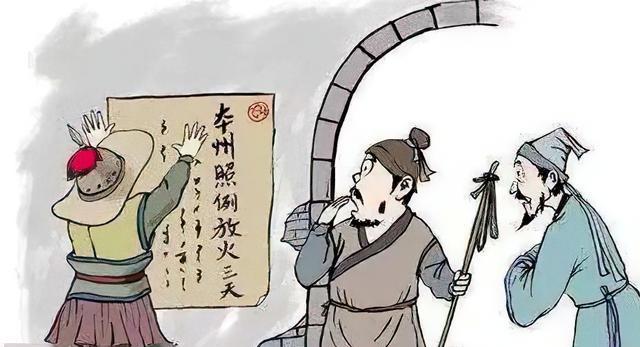"Avoidance" is a phenomenon peculiar to Chinese feudal society, and people cannot call the emperor and the honorable chief by their first names, and they must add or subtract strokes when writing. If you commit a taboo, you are likely to go to jail or lose your head. Students who have committed taboos in scientific examinations cannot take the exam again for life, and even if they are full of talent, they are unable to stretch. Li He, who was called "poetry ghost" by later generations, fell for the rest of his life because his father's name was "secretive" and he could not take the exam.

Historically, because of avoidance, it has caused many changes to people's lives, and in order to abide by these "rules", there have even been many jokes, some of which are ridiculous.
I believe that everyone has heard the phrase "only state officials are allowed to set fires, and the people are not allowed to light lamps." There is a story in Lu You's "Notes on the Old School", a certain state is too conservative to be named Tian Deng, so the people under his rule should avoid his name. And "lamp" is homophonous with "deng", in order to avoid punishment, people will change the name of "lamp" to "fire". However, on the fifteenth day of the first month of each year, the state has the custom of viewing the lanterns. The government therefore posted a notice: "The state, in accordance with the custom, set fire to it for three days. The people were frightened and fled, and "only the governor was allowed to set fires, and the people were not allowed to light the lamps" was also spread.
The Tang Dynasty was an era of relatively open style and culture in history, but there were also many taboos. Therefore, starting from Li Shimin, the Tang Dynasty strictly prohibited folk from beating tigers, eating tiger meat, and soaking tiger bone wine, because Li Yuan's father had the word "tiger" in his name, and people needed to avoid it, which was quite normal.
But, you know what? Modern toilets and urinals, known as "tigers" during the Han Dynasty, are named after Li Guang's shooting of tigers. During the Tang Dynasty, this name naturally could no longer be called. So it was renamed "Horse", and gradually it was called a toilet.
If all this is acceptable, then Tang Xuanzong Li Longji twice issued an edict "forbidding the world to catch carp", which made many foodies strangle their wrists. After all, carp is a common fish, its adaptability is strong, hardy, alkali resistant, resistant to hypoxia. That is, commonly known as, good to feed. Whether it is braised or steamed, the taste is good.
However, the emperors of the Tang Dynasty were all surnamed Li, and "carp" was homophonous with "Li", and eating carp naturally became an impermissible existence. However, the Tang Dynasty poet Wang Wei's "Luoyang Children's Journey", "The good man Yule rides on a horse, and the maid jinpan carp." Bai Juyi's "Boat Trip", "There is a row stove at the bow of the ship, and the red carp is cooked with rice." "Wait, there are also many descriptions of the use of carp, which shows that the majority of foodies have not reduced their enthusiasm for carp. There was no taboo on carp, and it was not eaten less, and even ate tricks.
However, if you want to say that the most bizarre taboo is the Taiping Heavenly Kingdom. The top brass of the Taiping Heavenly Kingdom believed that those who did not have merit were not qualified to use the word "wang", so the people with the surname of "Wang" under their rule were forced to change their surnames. It should be known that "Wang" has always been a large surname of the Han nationality, with a large population. His order really caused many people to be dissatisfied.
If there is still a reason for changing the surname, then changing the place name is really speechless. Because the leaders of the Taiping Heavenly Kingdom were all from civilian origins, and most of the names were more down-to-earth, in order to avoid feng Yunshan's name, Yunnan became Yunnan, and Shanxi and Shandong became Shandong and Shanxi, without considering the feelings of Taihangshan at all. There is also a Western King Xiao Chaogui, who directly turned Guizhou into Guizhou, and those who do not know it still think that it has anything to do with Guilin.
To say that the most unfortunate is that it is directly subordinate to the province, which originally meant direct rule and direct management. However, Hong Xiuquan was directly changed to "Sin Province". In addition, there are all kinds of avoidance and renaming. Sometimes I can't help but make posterity full of sighs, fortunately, the Taiping Heavenly Kingdom Movement failed, otherwise the name of the ancestral home would become a joke, and more people would not even be able to keep the surname of their ancestors.
This article statement: the text is original, without permission may not be reproduced (the picture comes from the network, if there is any offense, please contact to delete)